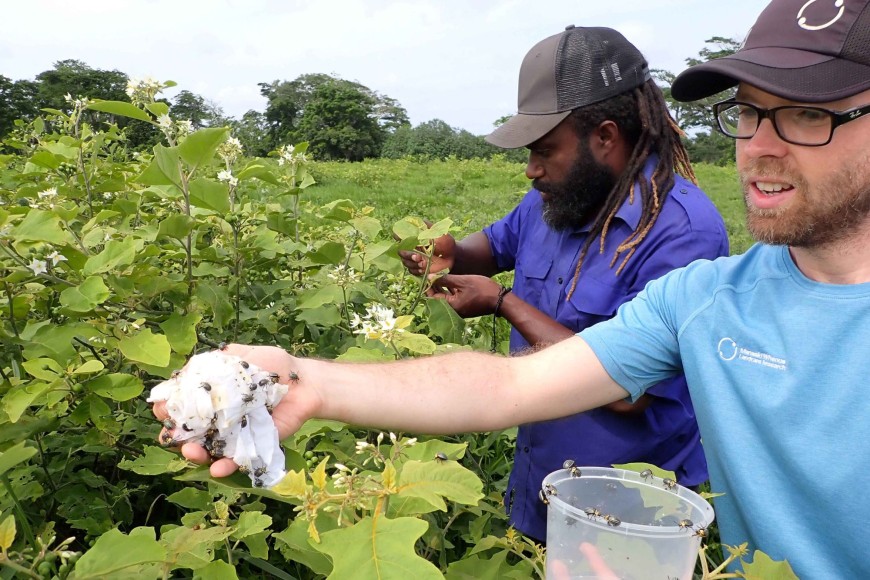
Manaaki Whenua - Landcare Research entomologist Arnaud Cartier and Biosecurity Vanuatu officer Lee Haword Bangdor, making a field release of Pico beetle on prickly solanum weed in Efate, Vanuatu.
The pico beetle, native to Jamaica, is the first natural enemy ever released globally to target prickly solanum. The adult beetles and their larvae both feed on the leaves, effectively stripping the plant and allowing pasture to regenerate.
As the technical lead for the Secretariat of the Pacific Regional Environment Programme’s (SPREP) Pacific Regional Invasive Species Management Support Service’s (PRISMSS), Natural Enemies - Natural Solutions (NENS) programme, a team from Manaaki Whenua – Landcare Research (MWLR) is delivering the beetles to Biosecurity Vanuatu in the first week of November. MWLR researchers have spent five years studying the beetle and determining its suitability to deploy.
The PRISMSS NENS programme aims to lower the impact of widespread invasive plants. Led by MWLR, NENS reduces the vigour of widespread weeds through reuniting them with safe natural enemies from their original homeland. The NENS programme initiatives empowers Pacific communities by improving the health and well-being of all living things and ecosystems.
“This release is of great significance for Vanuatu, where it was recently estimated that 34 percent of grazing land is lost to weeds. The most important pasture weed is prickly solanum, which was ranked the worst, or second worst weed on 81 percent of farms,” says senior researcher Dr Quentin Paynter, who leads the Vanuatu Weeds Programme.
“The release of the pico beetle will mean a natural enemy has now been released for three of the four worst pasture weeds in Vanuatu.”
This release builds on previous introductions, including the nail grass psyllid (Heteropsylla spinulosa) and the hibiscus bur lace bug, which were released on Efate in July and will soon be released on Santo. Work on wild peanut (Senna spp.) is still in progress.
Prickly solanum is a thorny shrub or small tree with broad, hairy leaves. It overtops most herbs, grasses, and shrubs, limiting the growth of other species. The weed has long posed a serious problem for farmers, particularly in cattle-grazing regions, where its thorny structure and toxicity make it unsuitable as fodder.
The plant’s rapid spread has forced some farmers to reduce livestock numbers or abandon parts of their grazing land.
The weed produces attractive berries that are rapidly dispersed by birds. In some Pacific countries, these berries provide habitat for pests like fruit flies, which damage valuable crops, compounding the challenges faced by local farmers.
“Prickly solanum has created a serious challenge for our livestock sector,” said Biosecurity Vanuatu’s Senior Plant Health Officer Ms Leisongi Bulesulu.
“Farmers have struggled with limited grazing land, and we’ve had to explore alternative methods to control its spread. The introduction of the pico beetle is a critical part of our long-term strategy to restore our pastures.”
The introduction of natural enemies like the pico beetle offers a sustainable, low-cost solution compared to the labour-intensive and costly methods of manual removal, slashing, and herbicide use. By allowing the natural enemy to control the weed’s growth, it is hoped that the beetles will significantly reduce the weed’s presence over time, providing much-needed relief to farmers and allowing pasture cover to thrive once again.
“When in abundant numbers, the pico beetle can completely defoliate and debark the prickly solanum weed, killing it. It is also important to note that this beetle only affects prickly solanum in Jamaica, where it has not been recorded affecting any crops of economic importance. Its safety has also shown in laboratory tests. We’re optimistic that this novel natural enemy will significantly reduce the weed’s presence and allow pastures to recover over time,” says Dr Paynter.
Following the release, researchers and local authorities will closely monitor the beetles’ establishment and effectiveness in controlling prickly solanum. If successful, the project could serve as a model for other Pacific nations facing similar invasive species challenges, strengthening the region’s resilience through sustainable biocontrol solutions.
This Vanuatu Weeds Programme is funded by New Zealand’s Ministry of Foreign Affairs and Trade.
PRISMSS is a coordinating mechanism designed to facilitate the scaling up of invasive species management in the Pacific. It brings together experts to provide support within the region, focusing on the protection of indigenous biodiversity and ecosystem function, and offers a comprehensive suite of support services in a cohesive, effective, efficient, and accessible manner to Pacific Island countries and territories.
Key contacts





